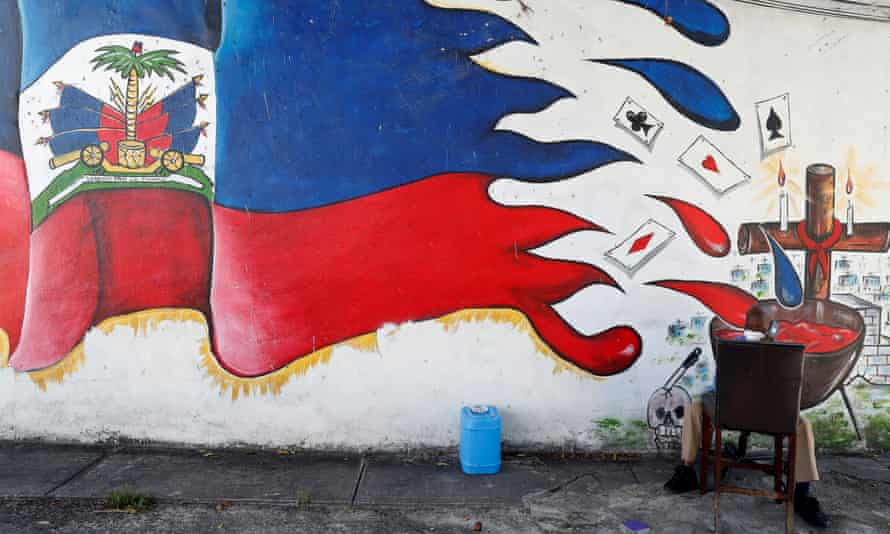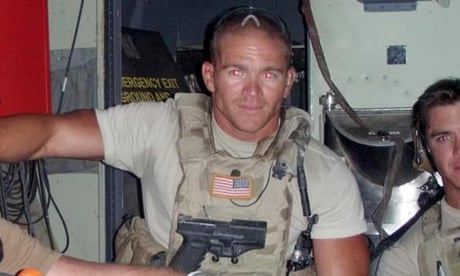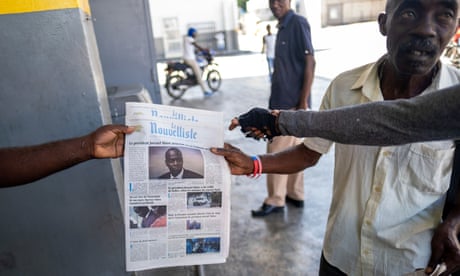Exile communities, ready supply of military veterans, history of corrupt local politics and drugs money make city a nexus for mayhem

A man sits next to a mural in the Little Haiti neighborhood of Miami.
Photograph: Shannon Stapleton/Reuters
Julian Borger
Tue 13 Jul 2021
One of the less surprising developments in the unfolding mystery of the assassination of Haitian president Jovenel Moïse is the central role of Miami in the whole story.
For decades, Miami has been the launching pad and a byword for half-baked plots and coups – from the Bay of Pigs, the failed invasion of Cuba in 1961, to last year’s harebrained raid on Venezuela, and now, allegedly, last week’s murder of the Haitian president. Most of the supposed participants were killed or arrested in the 24 hours after the murder.
The main suspect, Christian Emmanuel Sanon, is a Haitian with strong ties to the Miami area, as does another Haitian-American detained by the Haiti authorities, and the security firm alleged to have recruited the Colombian mercenaries accused of involvement in the attack has an office in Doral, just by Miami International Airport and Donald Trump’s golf resort.
The security firm reportedly named by some of the plotters, calls itself the Counter Terrorist Unit Federal Academy (CTU) and is run by a Venezuelan exile. When Miami Herald reporters went to knock on the door of its modest offices, no one opened the door.

'His head wasn't in the world of reality': how the plot to invade Venezuela fell apart
It is all reminiscent of the ill-fated Operation Gideon, a brazen abortive raid on Venezuela in May last year, hatched in Miami by exiles and mercenaries run by a gung-ho former Green Beret, Jordan Goudreau. That plot left eight people dead and 100 arrested. As in Haiti, the raiders were paraded in front of the cameras by the government they were supposed to overthrow, to rub in the humiliation.
Miami has all the ingredients required for an nexus of mayhem: several exile communities, dreaming and scheming about a return to power in their home countries, a ready supply of military veterans with Latin American and Caribbean experience from US Southern Command, headquartered in Doral, and a long history of corrupt, ethnically-driven local politics to provide a permissive environment.
Narco-dollars from the cocaine trade have historically served as the connective tissue and lubricant between these three pillars.
In her book on Miami, author Joan Didion wrote that its exiles were under “a collective spell, an occult enchantment from that febrile complex of resentments and revenges and idealizations and taboos which renders exile so potent an organizing principle”.
The urban sprawl that runs up the coast from Miami to Fort Lauderdale to West Palm Beach is home to the diaspora of most Latin American states, but the three most significant and active communities today are Cuban, Venezuelan and Haitian.
The Cubans have traditionally been based in Little Havana, just west of downtown Miami. A few miles to the north is the densely packed neighbourhood of Little Haiti. The Miami Venezuelans are more dispersed but the biggest concentration is in Doral.
“It’s the exile headquarters of the world,” said Anne Louise Bardach, who reported extensively on the city for her book Cuba Confidential: Love and Vengeance in Miami and Havana. “It’s because Florida is a peninsula that is basically a dagger cutting into the Caribbean and aimed at Latin America.”
The exile communities, Bardach said, operate almost like autonomous countries, with their own internal governance, their political machines, their own radio stations and newspapers.
“It’s a hotbed: people aching for their homeland,” she said. “They are all governments-in-waiting, and they all think they are about to take power next week.”
Each of the exile communities inevitably has its own relationship with US intelligence and their aspirations have played a role in US foreign policy.

Haiti president’s assassination: what we know so far
Cuban exile militias trained in the Everglades ever since the 1959 revolution, coming under the control of Jorge Mas Canosa, an exile who became a major force in Florida politics and in Washington. The Cuban and Venezuelan diaspora vote played a major part in swinging Florida to Trump in 2016 and 2020.
The city’s Haitian community has historically had less clout, but it has been a major force in Haitian affairs, while helping drive the demand for the security companies that have sprouted up across South Florida.
“The longstanding precarious nature of Haiti’s security environment is such that Haitian elites have long relied upon private security firms to ensure their own personal security,” said Jenna Ben-Yehuda, a former Haiti analyst at the US state department, and now president of the Truman National Security Project.
“The presence of private security has been pervasive throughout Haiti for decades, probably exceeding the number of Haitian national police officers.”
There are plenty of firms run by former US special forces soldiers seeking a comfortable retirement, like Goudreau. The firm named by the Haitian police as recruiting the Colombians in the attack on Moïse, CTU, did not have quite the same pedigree. Its owner, Tony Intriago, boasted of police experience in Latin America, and special forces connections, according to a Miami Herald profile, but none of it was confirmed. The Haitian police have so far not presented evidence of CTU’s involvement, and Intriago has been unavailable for comment since the assassination.
The initial signs suggest that the Haiti operation was aimed at something far more ambitious than mere murder, up to and including regime change. The fact that it fell well short, and simply added to the misery and chaos of its target country, is in many ways, just another Miami hallmark.
Julian Borger
Tue 13 Jul 2021
One of the less surprising developments in the unfolding mystery of the assassination of Haitian president Jovenel Moïse is the central role of Miami in the whole story.
For decades, Miami has been the launching pad and a byword for half-baked plots and coups – from the Bay of Pigs, the failed invasion of Cuba in 1961, to last year’s harebrained raid on Venezuela, and now, allegedly, last week’s murder of the Haitian president. Most of the supposed participants were killed or arrested in the 24 hours after the murder.
The main suspect, Christian Emmanuel Sanon, is a Haitian with strong ties to the Miami area, as does another Haitian-American detained by the Haiti authorities, and the security firm alleged to have recruited the Colombian mercenaries accused of involvement in the attack has an office in Doral, just by Miami International Airport and Donald Trump’s golf resort.
The security firm reportedly named by some of the plotters, calls itself the Counter Terrorist Unit Federal Academy (CTU) and is run by a Venezuelan exile. When Miami Herald reporters went to knock on the door of its modest offices, no one opened the door.

'His head wasn't in the world of reality': how the plot to invade Venezuela fell apart
It is all reminiscent of the ill-fated Operation Gideon, a brazen abortive raid on Venezuela in May last year, hatched in Miami by exiles and mercenaries run by a gung-ho former Green Beret, Jordan Goudreau. That plot left eight people dead and 100 arrested. As in Haiti, the raiders were paraded in front of the cameras by the government they were supposed to overthrow, to rub in the humiliation.
Miami has all the ingredients required for an nexus of mayhem: several exile communities, dreaming and scheming about a return to power in their home countries, a ready supply of military veterans with Latin American and Caribbean experience from US Southern Command, headquartered in Doral, and a long history of corrupt, ethnically-driven local politics to provide a permissive environment.
Narco-dollars from the cocaine trade have historically served as the connective tissue and lubricant between these three pillars.
In her book on Miami, author Joan Didion wrote that its exiles were under “a collective spell, an occult enchantment from that febrile complex of resentments and revenges and idealizations and taboos which renders exile so potent an organizing principle”.
The urban sprawl that runs up the coast from Miami to Fort Lauderdale to West Palm Beach is home to the diaspora of most Latin American states, but the three most significant and active communities today are Cuban, Venezuelan and Haitian.
The Cubans have traditionally been based in Little Havana, just west of downtown Miami. A few miles to the north is the densely packed neighbourhood of Little Haiti. The Miami Venezuelans are more dispersed but the biggest concentration is in Doral.
“It’s the exile headquarters of the world,” said Anne Louise Bardach, who reported extensively on the city for her book Cuba Confidential: Love and Vengeance in Miami and Havana. “It’s because Florida is a peninsula that is basically a dagger cutting into the Caribbean and aimed at Latin America.”
The exile communities, Bardach said, operate almost like autonomous countries, with their own internal governance, their political machines, their own radio stations and newspapers.
“It’s a hotbed: people aching for their homeland,” she said. “They are all governments-in-waiting, and they all think they are about to take power next week.”
Each of the exile communities inevitably has its own relationship with US intelligence and their aspirations have played a role in US foreign policy.

Haiti president’s assassination: what we know so far
Cuban exile militias trained in the Everglades ever since the 1959 revolution, coming under the control of Jorge Mas Canosa, an exile who became a major force in Florida politics and in Washington. The Cuban and Venezuelan diaspora vote played a major part in swinging Florida to Trump in 2016 and 2020.
The city’s Haitian community has historically had less clout, but it has been a major force in Haitian affairs, while helping drive the demand for the security companies that have sprouted up across South Florida.
“The longstanding precarious nature of Haiti’s security environment is such that Haitian elites have long relied upon private security firms to ensure their own personal security,” said Jenna Ben-Yehuda, a former Haiti analyst at the US state department, and now president of the Truman National Security Project.
“The presence of private security has been pervasive throughout Haiti for decades, probably exceeding the number of Haitian national police officers.”
There are plenty of firms run by former US special forces soldiers seeking a comfortable retirement, like Goudreau. The firm named by the Haitian police as recruiting the Colombians in the attack on Moïse, CTU, did not have quite the same pedigree. Its owner, Tony Intriago, boasted of police experience in Latin America, and special forces connections, according to a Miami Herald profile, but none of it was confirmed. The Haitian police have so far not presented evidence of CTU’s involvement, and Intriago has been unavailable for comment since the assassination.
The initial signs suggest that the Haiti operation was aimed at something far more ambitious than mere murder, up to and including regime change. The fact that it fell well short, and simply added to the misery and chaos of its target country, is in many ways, just another Miami hallmark.
No comments:
Post a Comment